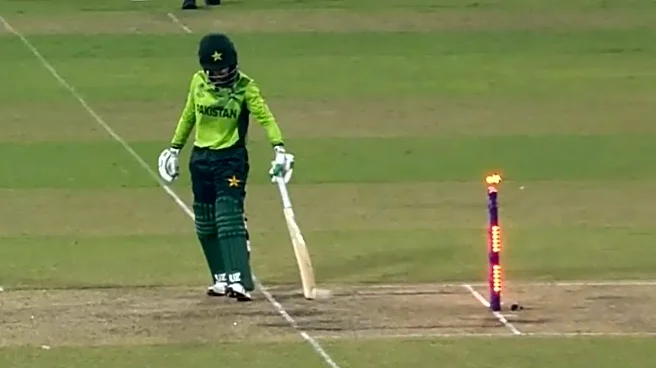Colombo, Oct 5: Another India-Pakistan cricket match, another controversy. The long-standing tension between the two sides resurfaced during the ICC Women's World Cup 2025 encounter in Colombo on Sunday (October 5), when Pakistan opener Muneeba Ali was controversially declared run-out early in the innings - triggering confusion, protests, and heated words between Pakistan captain Fatima Sana and the match officials.
The flashpoint came during the final ball of the fourth over of Pakistan's chase, bowled by Indian pacer Kranti Goud, with Pakistan reeling at 6 for no loss. The delivery produced simultaneous appeals for LBW and run-out, setting the stage for one of the most debated umpiring moments of the tournament so far.
The Incident - Why Was Muneeba Ali Given Out?
On the delivery, Muneeba
played across the line and missed. As the ball deflected off her pad and rolled toward short fine-leg, wicketkeeper Richa Ghosh collected and threw down the stumps in a flash. India immediately appealed for both LBW and run-out.
The on-field umpire denied the LBW appeal, but referred the run-out to the third umpire for review. Replays showed that Muneeba had reached her crease, but crucially, her bat was in the air - not grounded - when the ball hit the stumps.
After multiple replays, the third umpire ruled Muneeba Out, concluding that although she was inside the crease line, her bat had not made contact with the ground when the wicket was broken.
Understanding the ICC Rule Behind the Decision
The decision, while technically correct, left many viewers confused. According to the Marylebone Cricket Club (MCC) Laws of Cricket, Law 30.1 states:
"A batter is considered to be out of their ground if neither their bat nor any part of their person is grounded behind the popping crease when the wicket is put down. "
However, a 2023 ICC interpretation added that if a batter has already made their ground and their bat or body is momentarily in the air due to momentum while running or diving, they shall remain safe - provided they have not left their ground deliberately.
In Muneeba's case, she was not running or diving. She had completed her movement and lifted her bat slightly as she looked back toward the umpire during the LBW appeal. Because her bat was raised voluntarily and not due to momentum, she was considered out of her ground when the bails were dislodged.
Hence, the third umpire's ruling followed the law's literal interpretation, even though, to the naked eye, Muneeba appeared safely home.
Fatima Sana Argues with Umpires
The ruling did not go down well with the Pakistan camp. Captain Fatima Sana immediately walked toward the boundary ropes, where Muneeba - visibly frustrated - was still standing near the rope, refusing to leave the field.
Cameras caught Sana arguing animatedly with both on-field umpires, gesturing toward the big screen and demanding an explanation. The Pakistan skipper appeared to be referencing the "bat in the air after grounding" rule, insisting that her opener had completed the run and should have been declared safe.
The exchange lasted several minutes, with Pakistan's dugout also expressing visible dissent. But the umpires stood firm, reiterating that Muneeba's bat was airborne before she had been given not out for the LBW appeal - hence, the dismissal stood.
Confusion and Debate Across Social Media
The incident quickly lit up social media, with fans and analysts divided over the correctness of the decision. Some argued that the umpires had followed the rulebook, while others felt the decision contradicted the spirit of cricket, especially since Muneeba was not attempting a second run.
Former players and commentators on broadcast pointed out the nuanced interpretation of Law 30, explaining that the distinction lies in whether the bat is in the air because of running momentum or conscious lifting.
For Pakistan, however, the technicalities provided little comfort - the team had lost an opener, their captain was visibly angry, and India had drawn early blood in a tense World Cup clash.
The Growing Indo-Pak Friction
This controversy added another chapter to a growing list of on-field flashpoints between India and Pakistan's women's teams. Earlier in the match, the toss itself was mired in confusion, with Pakistan winning the toss after what appeared to be a wrong call from Fatima Sana.
Moreover, the match once again saw no handshake between the two captains, continuing a trend that began during the Asia Cup 2025. The gesture - or lack thereof - has come to symbolise the frostiness between the two sides.
With the Muneeba incident now added to the mix, the rivalry's emotional edge has once again overshadowed the cricket.


/images/ppid_59c68470-image-177105003432353455.webp)
/images/ppid_a911dc6a-image-177104902795770968.webp)


/images/ppid_a911dc6a-image-177105253714182198.webp)

/images/ppid_a911dc6a-image-177105248655682778.webp)
/images/ppid_a911dc6a-image-177105245071149153.webp)


/images/ppid_a911dc6a-image-177105042575465447.webp)
/images/ppid_a911dc6a-image-177105033328862095.webp)
/images/ppid_a911dc6a-image-177105037137039801.webp)
